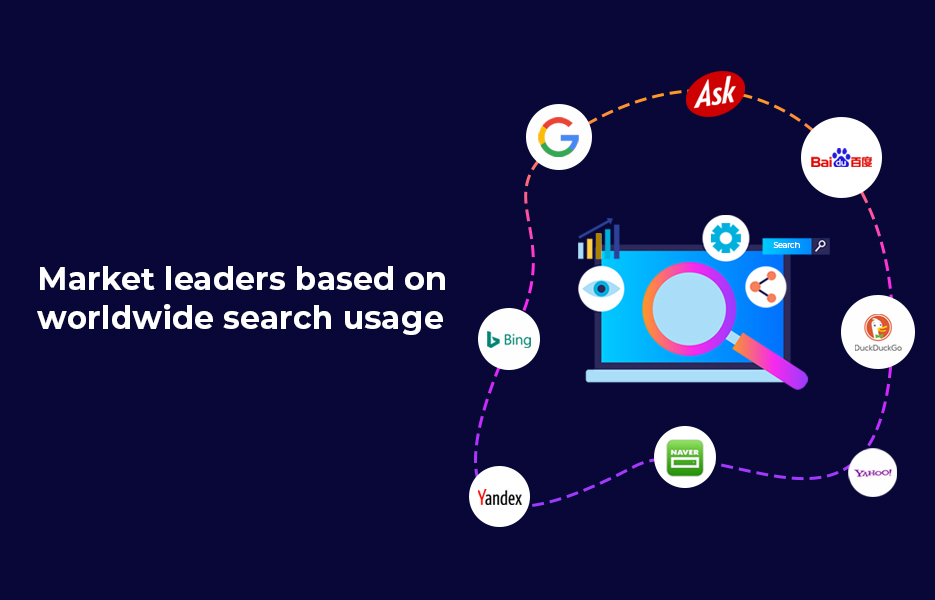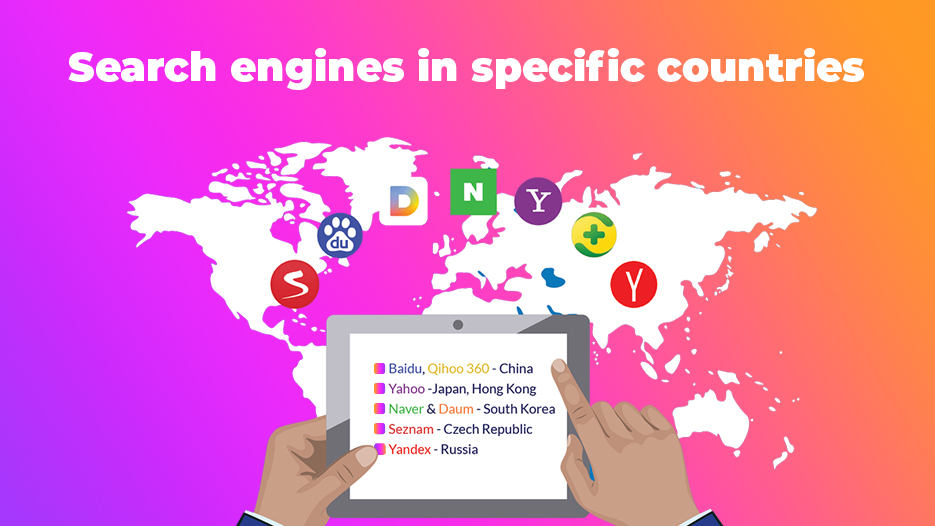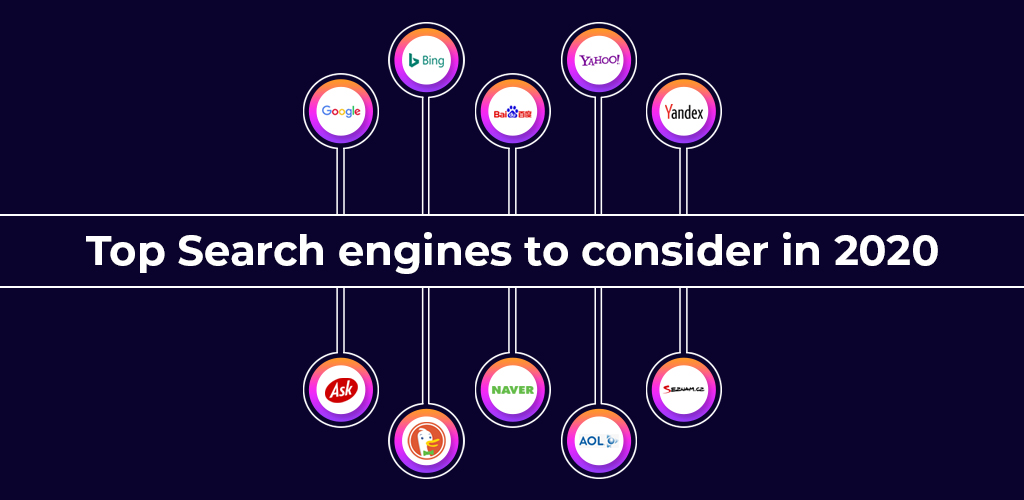Top search engines to consider in 2020
Online, you need to work together with search engines to get people to find and notice your brand and products. Search Engine Optimization (SEO) is a billion dollar industry, and if you talk to most people, the term ‘Search Engine’ is synonymous with one company – Google. While they are, in fact, massively dominant in the market, it may not be true of the market you’re targeting – Whether geographically, or in terms of the specific group of people you’re targeting, know the audience and your customers to make sure you’re going to be on their radar, and to ensure that you get the biggest ‘bang for your buck’. On average, people use search engines 3 or 4 times a day.
Because of this, we’re going to talk about the leading search engines – Not just worldwide and geographically, but some of the search engines with smaller user bases but which have different values or reasons to priorities them. This will allow you to think about where to allocate your resources. Don’t forget, approximately 93% of web traffic starts with a search engine query, so your organic rankings on search engine research pages are incredibly important.
There are a wide range of tools available for SEO as well, which we have discussed. Once you know what and where you’re targeting your efforts on, start thinking about how to get the most from the work you put in on those platforms and territories.
Market leaders based on worldwide search usage

The most common way of evaluating search engines is based on overall usage – This is because their volume of usage often defines their income (via paid advertising). The more money you have, the more options you have for development of the search engines and other products which can again improve your income and direct people back to your search engine. But sometimes your focus might be less on financial options – we will discuss this in a later section of the article.
Google (92.18%)
It’s hard to remember a time when Google DIDN’T loom over our business and personal lives like the hug, black monolith in 2001: A Space Odyssey. Not only do they get over 90% of the world’s search traffic, Google provides our email (Gmail for both business and personal accounts), they provide free office software, store our files, provide navigation, reviews AND they provide the software that runs our phones, tablets, etc. (currently Android has almost 87% market share in mobile devices). They even power one of the other search engines on this list, so don’t underestimate how much further they can go! Google.com is the most popular site on the internet. YouTube is the second most popular, and they own that, too! 8.4% of Google searches result in a click on another Google-owned property. This includes 1.8% that lead to YouTube (Though 6.3% of results include videos), 0/9% to Google Maps, 0.16% to Gmail and 0.55% to Google Shopping. They also now own Fitbit, so they know how much you exercise, your heart rate, blood pressure, etc.
And we all view these websites using Google’s Chrome browser.
Launched by Sergey Brin and Larry Page in 1996, it’s named after a Google, a mathematical term for a large number (a ‘1’ followed by one hundred zeroes). We almost didn’t have Google as we know it today – in 1996, the owners offered to sell the up and coming search engine to Excite!, a now defunct search engine company, for the modest sum of $750,000. Google, and its parent company, Alphabet, are now valued at over $750 billion. Larry Page, now Alphabet’s CEO, is the 8th richest person in the world, valued at $53.5. Sergey Brin, Alphabet’s President, is the 9th richest, with ‘only’ $52.1 billion in the bank. Search is big money, in case you hadn’t guessed.
Part of this comes down to their habit of constant innovation – With access to so much data about what we are searching for, visiting, buying, etc it gives them a very impressive ability to predict wants, needs, and where NOT to go next.
They know that their position makes them a target too – They make regular tweaks and updates to their search algorithms to stop people ‘gaming’ the results and achieving unwarranted success, for example, and by being very careful with what they release, and forging strong links between products and services (including acquisitions like NEST being integrated into Google Home). They have become known for success, but that’s not always true – Remember Google+?
But Google isn’t as dominant everywhere – In the UK, for example, it only has 85% of the search traffic, 79% in South Korea, 74% in Japan. In Russia, it only accounts for 49% of traffic, while China, with its ‘Great Firewall’ and regulations about state access to information, only puts 6% of its search traffic through Google.
Google doesn’t have it all its own way, though – With such large market share there are noticeable concerns about its influence and ability affect people and policy. The EU alone has fined Google over 8 billion Euros in antitrust monopoly penalties relating to their advertising business. Most recently, in March 2019, Google was fined 1.5 billion Euros for violating antitrust regulations. It was imposing contractual regulations on third parties to impair their competitiveness.
Google’s search engine dominance allows it to make large volumes of money to fund its efforts through Google Ads (And Google Shopping), which also reinforce the need for its search results to be as accurate and current as possible. If people can’t trust your search results to be accurate, they’ll go elsewhere. It therefore uses not just your current query, but all of your other searches and actions it has on you to create a ‘profile’ of your preferences and previous searches, customizing your search results. This information also helps to target advertising for you. Try searching in an anonymous browser window and a normal browser, and compare the results. This is usually to your benefit, showing you things you want to see, but it can also serve to confirm your existing biases and create a ‘bubble’ when researching news, for example.
Be aware of this when doing website/search testing, for example, and don’t forget to check your results sometimes to be sure you’re seeing what others will see.
Google offers its results based on the type of result – Standard text search, images, shopping results. news stories, videos, maps, books, flights and financial stories. This allows you to quickly filter out many ‘irrelevant’ results. It also means you should plan when creating and promoting your business as to how and where people will find you and your products.
Bing (8.04%)
Bing is owned by Microsoft, and grew out of their old MSN Search and Windows Live Search products. It may be much smaller than Google, but, with 1.3 billion visits per month, it is still touching a lot of people – And its visitor numbers, which bottomed out in September 2019, have started to climb again.
Bing does offer a similar breakdown of search results (Standard results, images, videos, maps, news and shopping), but they have chosen a more visual approach, using images on their homepage and visual snippets for news, which can make the basic site more engaging.
Bing have made some significant adjustments of their own, however. The site offers the ability to save searches, and return to them later, for example. They also offer a Rewards program, so that you can earn points for using their platform and turn them in to product purchases or discounts.
This means that, if your target market or demographic have an interest in Bing, you might just get an unusually good return out some efforts in targeting Bing Ads and SEO for their search engine. It is particularly popular in the US (33%) and Germany, with a small following in China, too.
Baidu (7.34%)
If you live in China, or have worked there, then you will know Baidu. Founded in 2000, it’s the dominant search engine in China (75%) due to the ‘unique’ Chinese approach to the internet. The ‘Great Firewall’ as it’s known, encompasses not just firewalls to censor and control information flowing in and out of the country, but sophisticated hardware within the country that monitors ALL communications and postings for an extensive set of keywords to censor information and opinions that might contravene official policies. In addition, Chinese laws and regulations, along with the official censorship bodies, require that any Western companies operating in the country must comply with similar methods, leading to many leading names either staying out of the market, or being side lined in favour of native Chinese companies that are obliged by law to cooperate with the government when requested.
Baidu is focused on that market, with native translation extensions required for the Chinese language, and it also has an extensive encyclopedia built in, so it also supplants Wikipedia in the Chinese market (All 1.8 billion people). It might have 95% of its traffic from mainland China, but Baidu also has a lot of users in the US, Taiwan, Hong Kong and South Korea.
Baidu also offer mobile app development, an app store, AI development, and also navigation, image hosting and cloud data storage. They are also leading the way in many mobile-specific areas and technology, because the Chinese consumer market largely leapfrogged early PCs and went straight from mobile phones. As it establishes itself and creates new partnerships, they are clearly looking to catch up with Google, and make an impression. You could do worse than to keep an eye on them as they continue to grow more aggressively.
Yahoo! (3.39%)
Yahoo! (Don’t forget the exclamation mark) is the oldest entry on this list – Founded in 1994 by Jerry Yang and David Filo, Yahoo! (Yet Another Hierarchical Organised Oracle) wasn’t the first name they gave their project – But it’s snappier than “Jerry and David’s Guide to the World Wide Web”, and ages better. In 2000, their web services, Flickr and the fact that many people’s online mail was at yahoo.com made the company valuation $125 billion, but they blew it all. And it all started with one decision – they were offered Google for a billion dollars, but they turned down Larry Page and Sergey Brin.
It didn’t take long before other cracks started to show. Gmail took over from Yahoo Mail as the preferred web mail platform. Flickr was passed over for Instagram when it comes to sharing images online, and then Quora took over from Yahoo Answers as the preferred place to ask questions and get answers.
More recently, in the ultimate humiliation, Yahoo! Ceased to operate their own search engine. Instead, they merely curate search results from Bing, meaning most SEO targeted on Bing should work for Yahoo.
Yandex (1.53%)
Yandex’s relatively small percentage of worldwide search traffic is offset by its high penetration in its core market, Russia, with 56.5% of the traffic, while Google is only just over 40%. Yandex is also popular in former soviet states with high numbers of Russian speakers, including Kazakhstan, Ukraine, Uzbekistan, Belarus – But also, surprisingly, Turkey.
Yandex (Standing for “Yet another iNDEXer”) adopted that name in 1993, and one of its primary reasons for popularity with Russian speakers is that it’s better designed to work in the Russian language. The Russian language is a lot more precise than English, with more than 20 possible ways to end words indicating their relationship relative to each other. Yandex is much better able to handle those relationships than other search engines, making it a much more effective option for the native Russian speaker.
Yandex, like Google, offer a range of different services other than search, including online file storage, which has also helped their popularity for those who don’t want to be reliant on American tech companies. Their search portal also offers Weather, movie trailers, weather, translation, news, and maps. In 2011, Yandex went public, with an IPO (Initial Public Offering) on the New York Stock Exchange of $1.3 billion – At the time they were the second biggest IPO, lagging behind only Google. Their current market capitalization is $11.92 billion.
Ask (0.72%)
Originally known as ‘Ask Jeeves’ when launched in 1996 by Garrett Gruener and David Warthen, it was intended to be a virtual assistant or virtual concierge – An online question and answer service (Hence naming it after the butler in the P. G. Wodehouse books). The site was based on software designed and written by Gary Chevsky and was supposed to answer natural language questions intelligently, as well as ‘traditional’ search terms.
As time went on, it became obvious that wasn’t working for them, and they started transitioning to becoming a more traditional search engine, rebranding to just ‘Ask’ in 2006. In 2007, to differentiate themselves, Ask offered the ‘Binoculars’ option to preview the sites listed in results before clicking on them, and the ‘AskEraser’ feature, letting users opt out of tracking their search queries, IP addresses and cookies. 2008 saw ‘Ask Kids’ launched, a filtered search service for children to use – depending on your target market, you may want to check your site’s visibility here.
In 2010 they launched (in Beta, then later live) a Q&A feature/service, where people could answer the questions posed by other users. They also launched an iPhone app for this later the same year.
Also in 2010, however, facing insurmountable competition with limited resources, they finally admitted defeat, and instead of closing, they signed a deal to use Google to drive their portal, focusing on the way they curated and returned the results to users. This has allowed them to return their focus to natural language processing for questions. It did also result in 130 jobs being lost.
Ask also own the Lexico Publishing Group, which itself owns Dictionary.com, Reference.com and Thesaurus.com. It purchased them in 2008.
Ask has approximately 100 million users per month, globally.
DuckDuckGo (0.39%)
While most people are happy to use Google, there are an increasing minority that are concerned about privacy, in an age where the most valuable commodity is data about us. Google (and Facebook, among others) make most of their money selling information about us, in the form of targeted advertising spots – On the search pages, in social networks, on third party sites – Based on the information they gather through cookies, search activity and other things we do online using their services.
As this becomes more pervasive, there’s a slow, but growing industry in options that respect your privacy, such as DuckDuckGo for search. Founded in 2008, with the motto “Privacy, simplified”, they describe themselves as “The Internet privacy company that empowers you to seamlessly take control of your personal information online, without any trade offs.”
Because they don’t store information about you, where you go and what you look at, you will be much less vulnerable to targeted advertising. They even offer a Chrome extension to help transition easily to using them. With over 50 million searches per day, or 1.6 billion per month, the popularity of the privacy-focused search engine is increasing. They even offer their users tips on improving their privacy – all with only 83 employees (Alphabet/Google have over 110,000!).
Naver (0.13%)
With 75% of the South Korean search market, Naver has been called “The Google of South Korea”. They are also the most popular news site in South Korea, where 83% of the population read their news exclusively online. Of them, 64% read it on Naver, second only to Daum, another South Korean company who are read by 36%. Facebook only gets visited by 28% of the population! In Korea, newspapers and other organisations refer to Naver in terms of alligators, sharks and other apex predators due to its power within the South Korean market, but they pay 124 news outlets directly as “Naver News In-Link Partners” to put their content on their portal directly to make their offering more ‘sticky’. This frees them from being as reliant on more complex relationships with Google, Facebook and others, but, as always, they tend to feel Naver makes a lot more out of the relationship than they do. Their ads and access to user information ensures they are in a dominant position.
Naver generated $2.7 billion dollars in revenue in 2016 alone – Not much compared to Google, but hardly to be sniffed at. But it’s not just the money that gives them power – There are rumours that, as in China, not all news stories and information are treated equally, and that information that is not complimentary to the government may be harder to find.
Just like Google, Naver have embedded themselves in the South Korean internet economy with more than just search and news – They offer email, encyclopedia/education, a children’s search engine and more to keep people in the habit of using them. It seems that they are well embedded in that market, but not abroad, so if you’re likely to be selling in or targeting South Korean shoppers, only then would it be worth looking at Naver’s coverage of your brand and products – You’d benefit from looking into native speaker’s to help with your content as well.
AOL (0.06%)
Once upon a time, New York City based AOL was a behemoth – Back before the internet was anything other than an interesting novelty or fad. America Online (AOL), Compuserve and Prodigy were household names, with their own ‘mini internets’ of content and discussion when you ‘dialled up’ using a phone line, and downloading an MP3 could take an hour. They indexed all their own content and had chat forums for people to talk and ask questions as well as email. Later they included the internet, but in a very half-hearted way – They were always designed as self-contained communities.
As the internet took off, AOL became an increasingly profitable company. Their ubiquitous ‘free’ CDs were on the front of millions of magazines – It wasn’t uncommon for 10 or more to be floating around in a given house hold. In an age when people had to pay per minute for internet access, people might swap between free AOL CDs to save money – Account after account. AOL did so well, they bought their former competitor, Compuserve.
They bought NetScape, one of the early web browser companies, and then MapQuest, a predecessor to Google Maps. They decided that ‘old media was dead’, but that they keep and increase their subscribers with their original content, so they bought and merged with Time Warner, the media conglomerate, for $165 billion dollars in 2000. It may have been a stretch too far, though – The new company, AOL Time Warner, almost immediately had issues meeting expectations for growth and earnings.
When issues continued to dog the company, by 2003 they changed their name back to just ‘Time Warner’, with AOL as another business unit. In 2004, time Warner’s AOL unit narrowly avoided criminal charges for securities fraud due to accounting irregularities – they settled for $510 million and agreed to take ‘corrective measures’.
AOL Time Warner moved from Dulles to New York in 2001, and tried to realign themselves as an advertising company in competition with Google and Microsoft that also has an online portal (AOL.com) and other services, like AOL Messenger, MapQuest and others. Before long, even AOL.com fell by the wayside, and the focus was on the apps and advertising. There were job losses as the company reduced operations.
Eventually, in 2009, Time Warner spun AOL off as a separate unit again, because it was dragging the value of the whole company down. The ‘old media’ company that had been bought up by the new star had outlived it.
The new company focused on acquiring and integrating content, buying TechCrunchin 2010, The Huffington Post in 2011, and others – But they were ultimately bought by Verizon for $4.4 billion in 2015.
All the time this was occurring, AOL Search was a part of their business – Only a small piece, but it was still in regular use by a core group of fans. And so it continues to be a small player in the search market, and it may be something to review and test against if your target market are using it.
Seznam (0.05%)
You may never have heard of Seznam (or Naver, for that matter), but it’s popular in its home country, the Czech Republic, though not as popular as it once was. Google has since taken command of over 80% of the market.
Founded in Prague in 1996, by Ivo Lukačovič, Seznam started as ‘just’ a web portal and search engine, adding mail in 1998. It now offers news (Financial, social and political), a TV directory, dictionary, maps, weather and more offerings. Since 2012, their slogan has been Seznam – najdu tam, co neznám (Seznam – I find there, what I don’t know).
From launch, Seznam used search technology from another Czech company, Jyxo. In 2005 they moved to an engine developed in-house, however. They also bought Email.cz and merged it into their own email platform. They also did the same with another Czech email portal, Czech Online (@post.cz). Seznam also own 50% of the video site Stream.cz as of 2007, as well. Seznam operates it’s own version of PageRank, running from 0-10, known as the ‘S-Rank’.
Seznam ceased to be the dominant search engine sometime between 2011 and 2014, depending on whose figures you follow, but now Google is the major search engine, while Seznam has steadily dropped to its current level of around 12%.
Search engines in specific countries

Some search engines are very much focused on a specific country, and have their strongest representation in that home country. They may not compete globally, but they at least are well known in that sphere, and may be relevant to research and target if you’re working to sell there. Some of them, however, have their own issues – especially in countries where the government maintains more than the usual hold on the keys to power.
Baidu (China)
Headquartered in the Haidan district of Beijing, Baidu, Inc. is a multinational technology company which doesn’t just do search – It has made in-roads into AI and other internet technologies.
The name Baidu means, either “a hundred times” or “countless times”, and comes from the last line of a poem by Xin Qiji called “Green Jade Table in The Lantern Festival” – “Having searched hundreds of times in the crowd, suddenly turning back, he is there in the dimmest candlelight.”
Baidu’s Chinese language search engine is accompanied by:
- Baidu Maps
- Baidu Baike (A Chinese language encyclopedia, it’s the largest by users, page views and web traffic, but Hudong hosts more articles).
- Baidu Wangpan (Formerly Baidu cloud, this storage service offers 2TB of storage to users)
- Baidu Knows (A question and answer community, similar to Quora)
- Baidu Space (A searchable social network with profile pages, blogs and photo albums. They have over 100 million users by 2009, and still growing)
- Baidu Legal Search (A searchable database of Chinese national and local legal laws & regulations, as well as legal decisions and law dictionaries)
- Baidu Statistics (A searchable index of Chinese Government released statistical information)
- Bauidu Tongji (Baidu’s web analytics platform – Demographics, source of visitors, heat map, etc)
- Bauidu Youa (Baidu’s online eCommerce search service, similar to Google Shopping)
- Baidu Safety Center (Launched in 2008, provides online security checks, anti-virus and system repair facilities)
- Baidu Index (An online keyword research tool)
- Baidu Tuiguang (Baidu’s online advertising platform , operating ina similar manner to Google Ads and AdSense)
- Qunar (A travel booking service owned by Baidu)
And many others.
Baidu also offered a Japanese language translation service and search engine until 2015.
As with Google, they also have a range of products and services, and are the official ad reseller for Snapchat in Greater China, South Korea, Japan and Singapore.
With 76.05% of search engine activity in China, Baidu is highly profitable, with a market cap of $99 billion as of May 2018.
Baidu actually predated Google in offering pay per click advertising back in 2001, which grew into Baidu Tuigang. This, Baidu Index, Bauidu Tongji and Baidu Youa are the areas that most eCommerce professionals will be focused on learning and using. In addition, Baidu Union is an affiliate programme for programmes and websites that include Baidu’s search services and sponsored keyword ads, whether text or graphical.
Be aware, however, that there WILL be limitations on the effectiveness of your research and targeting – Baidu has a long history of cooperation with the Chinese government. Leaked documents in 2009 from an employee, for example, detailed a long list of blocked websites and topics.
Yandex (Russia)
Incorporated in the Netherlandes, Yandex N.V. primarily services Russia and the Commonwealth of Independent States. With offices in more than 17 countries worldwide, it has a search market share in Russia exceeding 52%. Its main competition is Google.ru, Mail.ru and Rambler.
Yandex’s main benefit is its enhanced handling of the Russian language for accuracy. It has an office in Lucerne for handling advertising by European companies, and one in Shanghai to work with Chinese companies wanting to advertise in the Russian language market.
Its roots are in Arkadia, founded in 1990 by Arkady Volozh and Arkady Borkovsky to develop MS-DOS software for patents and the classification of goods. Humble beginnings, but ‘Yandex’ was originally the search technology for the records within their software.
Arkadia become part of Comptex International in 1989, also one of Volozh’s companies. Volozh started working with a childhood friend, Ilya Segalovich, in in 1993 on enhancing the search software, releasing software for searching through the Bible in 1996 to prove its effectiveness. In 1997 they released Yandex.ru as an internet search engine specialised in working in the Russian language at the Softool exhibition in Moscom.
Yandex launched keyword/contextual advertising as a source of income in 1998, and was incorporated as a standalone company in 2000, succeeding Comptek as the search engine’s sole owner. 2001 saw the launch of the Yandex Direct online advertising network. In 2009, Yandex replaced Google.RU as the default Russian language search engine for the Mozilla Firefox browser, with version 3.5.
Part of the reason Yandex does so well in the Ukraine is their separate Yandex.ua portal, launched in September 2005 and based in Kiev. This was fully localized by 2009, and then they launched their ‘Poltava’ algorithm specifically for Ukrainian users. This office was later closed, in 2017, following raids by the security services and accusations that they were collecting private data on Ukrainians and passing it to the Russian FSB. They denied this, but closed the office. Later that year their services were banned in the Ukraine by a Presidential decree.
Privacy is possibly an issue with Yandex – In 2011 they disclosed that they had passed private information to the Federal Securty Service in Russia regarding donors to an anti-corruption website that had been setup by Alexei Navalny. This was disclosed before their listing to NASDAQ, in a document detailing “legal and political risks of investing in Russia”. In addition, they disclosed that, in 2019, they were being forced to hand encryption keys to the FSB, meaning that traffic through its systems would not be protected. They still assured users that this would not necessarily compromise their user’s private information.
Yandex opened an office in Istanbul in September 2011, and launched a Turkish search engine and other services.
In 2013, Yandex became, by revenue, the largest media property in Russia, in part through a range of prior acquisitions and investments, such as KinoPisk (a movie search engine), The Tweeted Times (News Delivery), and SPB Software.
Their search engine and other operations continue to grow, with acquisitions such as FoodFox, a food delivery service, and e merge with Uber’s operations in Russia, Azerbaijan, Armenia, Georgia, Kazakhstan and Belarus.
Voice search

An important thing to remember when writing content and working to ensure people can find your products, is voice search – With Alexa, Google Home, Siri, and Cortana, among others, reaching the public across the world, it’s increasingly important to consider how well your products are performing for queries spoken or asked, as well as discrete words or phrases typed into a search bar.
Questions are important

With over 1 billion voice searches per month, it cannot be ignored – It’s just so convenient for everyone. Voice searches tend to be in the form of a question – “What’s the nearest Pho restaurant?” for example, as opposed to “pho restaurant near me” or “Pho restaurants Cambridge”.
When doing your SEO research, you will be looking for long tail keywords. Why? Because long tail keywords are the phrases which have more components in them – more words. Natural questions are being asked in contrast to the more specific terms because it’s easier to speak them than to type them, and so long tail keywords are be9coming more important.
Think local

Voice searches, especially on mobile, are 3 times as likely as standard text searches to be targeted locally. This should be coupled with the knowledge that, between 2018 and 2019 58% of consumers successfully used voice search for the purpose of finding local businesses. This means that you should ensure you’re entry in Google Business is up to date and accurate – Past that, there are specialist local SEO agencies, or you can always google some advice.
Answer the question!

While optimising for voice search, you’re looking to optimise your SEO for natural language questions. If you follow through on that, and think about it carefully, that means your content needs to answer the question or questions you are optimising for.
If you ask a question, you want a direct answer – Spoken questions are usually based on an immediate need for an answer. Google has themselves shown a preference for direct answers when serving answers to these questions. Google (and Bing) also refer to direct answers as ‘rich’ answers, containing the specific information to answer that question with immediacy. Providing such answers will get a much better response – The search engines will priorities your content, and people will respond to it better.
Imagine asking Google for the next flight to Helsinki from Heathrow. What would your preferred response be?
- A table of flights from London Heathrow Airport (LHR) to Helsinki (HEL) on the current date.
- The page for flight BA 794, departing at 08:25, arriving at 13:20, an airbus A320, with average legroom of 76cm showing the available seats and a booking link.
I’m betting you would want option 2.
When it comes to the internet, we’d be lost without search engines – We’d rarely travel outside of a couple of sites, never knowing what or who to trust, or where to find things without being explicitly directed or invited. As such, when selling online these sites, and their underpinning software, are powerful weapons to get access to new prospects, or be rediscovered by people that haven’t interacted with you in a while.
They gather huge amounts of information, too (well, most do), and so can help you to identify niches to serve where products are missing, too expensive or customer service and quality are lacking.
When you have identified who and where your customers are, and which search engines they use, you can then look at how best to make your brand and products show up well, and rank highly for them. This may include employing a translator to make sure your written material comes across well.
If they can’t see you, they can’t visit you, or buy from you. Ultimately, that’s the important thing for those of us selling online where search engines are concerned, and knowing who they are will be a very important step.



DropShip products from verified suppliers to diversify your inventory and scale your eCommerce business